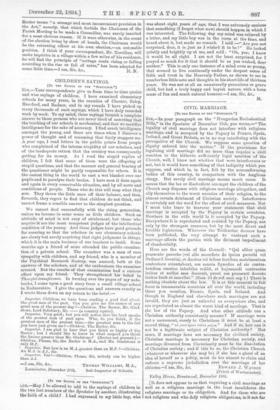CHILDREN'S SAYINGS.
[TO THE EDITOR OF THE " SPROUTORr]
SIR,—Your correspondents give us from time to time quaint and wise sayings of children. I have examined elementary schools for many years, in the counties of Chester, Salop, Hereford, and Radnor, and in my rounds I have picked up many thousands of such sayings, which I have duly recorded week by week. To my mind, these sayings furnish a complete answer to those persons who are never tired of asserting that the teaching of our schools is mechanical, and that we sacrifice intelligence for the sake of accuracy. I find much intelligence amongst the young, and there are times when I discover a power of thought and of reasoning that fairly staggers me. A year ago, I read letters in the public prints from people who complained of the intense stupidity of our scholars, and of the inadequate return that the country was consequently getting for its money. As I read the stupid replies of children, I felt that some of them were the offspring of stupid questions, and that the manner and general bearing of the questioner might be partly responsible for others. It is the easiest thing in the world to cast a wet blanket over our pupils and to paralyse their brains. I have seen it done again and again in every conceivable situation, and by all sorts and conditions of people. Those who do this will reap what they sow. They throw the little ones off their balance, and then, forsooth, they regret to find that children do not think, and 'cannot frame a sensible answer to the simplest question.
We cannot deal successfully with the rising generation, unless we become in some sense as little children. Such an attitude of mind is not easy of attainment, but those who acquire it are the most competent judges of the intellectual condition of the young. And these judges have good grounds for assuring us that the scholars in our elementary schools are slowly but surely acquiring that right judgment in things, which it is the main business of our teachers to instil. Some months ago a friend of mine attended the public examina- tion of a private school. The examiner was a man of rare 'sympathy with children, and my friend, who is a member of the Psychical Research Society, was amazed, both at the answers of the scholars, and at the enthusiasm the examiner 'created. But the results of that examination had a curious effect upon my friend. They strengthened his belief in Thought.transference. In turning over the pages of my note- books, I come upon a good story from a small village school in Radnorshire. I give the questions and answers exactly as I wrote them down on my return to the hotel:— Inspector. Children, we have been reading a good deal about the great men of the past. Can you give me the names of any great men of the present day P—Children. The Rector, Mr. Glad- stone, Lord Salisbury, Mr. — (a country squire). Inspector. Very good ; but you will notice that the book speaks of the greatest man of past ages. Who, do you think, is the greatest man of the present time,—the greatest man in the list you have just given me F--Children. The Rector, Sir. Inspector. I am glad to hear that you think so highly of the Rector; but I should like to know in what respect you think the Rector greater than Mr. Gladstone P (Rector not present.)— °Wares. Please, Sir, the Rector is M.A., and Mr. Gladstone is only at.r.
Inspector. But how is an M.A. greater than an M.P. P—Children. An M.A. is Al., Sir.
Inspector. Yee?—Children. Please, Sir, nobody can be higher than Al.
am, Sir, &a, THOMAS WILLIAMS, M.A., Leominster, December 171h. Sub-Inspector of Schools.

































 Previous page
Previous page